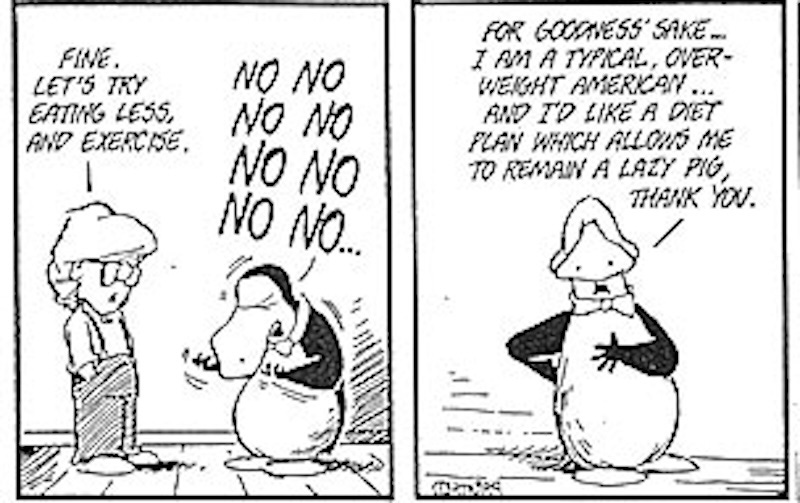People all across the political spectrum want government to fix society's problems. Even we libertarians do, after a fashion, in that we want government to shrink itself so that society's problems have a chance to resolve via market forces. This is natural and reasonable, given that government is where the power lies. And, in libertarians' (and some others') view, where many problems originate.
It is reasonable to say "if a government policy or program didn't work as intended, we should alter that policy or halt that program," is it not? Indeed, you will find that sort of logic applied all the time... to policies implemented by the other team. When the political winds shift and control of a city or a state or of the nation swings to the other team, we get some such reversals. Often, there are too few, because the two major parties are more alike than many care to admit, and because "bipartisan" sometimes happens, which mean there's no "other team" to reverse.
"Bipartisan" often stands in for "popular." "Popular," however, does not mean "correct." Or functional or effective or successful or sustainable.
That last bit, "sustainable," is a very popular word in certain quarters, and an increasingly common marketing gimmick. People, unfortunately, misapply it too often. Petroleum is decried as an energy source, not only because global warming, but because it is finite and we will eventually run out of it. The latter is technically correct - since the world is finite in size, anything in the world is also finite in quantity. It is, however, irrelevant. Long, long before we drain the world of all its petroleum, we will start to adjust. As reserves diminish, what's left will become harder to harvest, and therefore more costly. Market forces being as inexorable as the tide, people will adjust, alternate energy sources will become relatively more cost effective, and the world will shift away.
All on its own, without anyone at the top of the power pyramid making it so. That's the nature of market forces, and no one person or group of people is smarter than the market as a whole.
It's also a non-problem being used as an excuse to impose a desired outcome. Proven oil reserves keep growing and growing. We are finding more of the stuff faster than we are burning it, and there's no reason to conclude that will change any time soon.
Will that trend change, some day? Assuming the human race persists, yes. It could be fifty years from now, or five hundred. We don't know, can't know, and don't need to know. When the time comes, things will adjust on their own. Grousing that we need to act now to offset the eventuality of decreased oil supply is a solution in search of a problem.
Which segues into today's point: persistence of wrong answers. I just did a bit about how New York City's leaders won't address the root causes of housing shortages, and instead engage in high-visibility gimmickry to sell the notion that they are "doing something!" to the voters.
We can blame them for this ineffective and wasteful behavior, but the real blame deserves to be laid at the feet of the voters.
Voters don't actually want solutions. They want "their" solutions. They want their long-embraced ideas to continue to be implemented, even when those ideas provably don't work, and want some nebulous and miraculous add-on to make those ideas finally work.
Monopoly public schools that prioritize teachers over students have been failing those students for decades, yet suggest a modest change, like introducing school choice to put some market forces at work, and histrionic accusations ensue. Instead, the people who believe in the obviously failing system demand it persist, with more good money thrown after bad.
Rent control laws exacerbate housing shortages, yet trying to undo them in blue cities is political suicide.
Social Security is a slow-rolling train wreck, structured as a Ponzi scheme in which current workers fund retirees, and like all Ponzi schemes, requires forever growth to remain viable. Since we live in a finite world, that forever growth is impossible, making SS unsustainable. Here is one place where sustainability becomes a useful, and indeed vital, metric.
Despite this reality, Social Security (along with the fifty-two trillion dollar gorilla Medicare) is political kryptonite. Even staunch fiscal conservatives, when presented with remedies for this unsustainable program, scream "hands off!" They have been sold a bill of goods, i.e. that "their money" is being held in reserve for them, and that remarkable bit of salesmanship has ensured that there will come a day when the bill comes due and the pyramid collapses. That collapse will most likely be in the form of inflation, that great destroyer of wealth and prosperity, and it will make the inflation of the last three years look like a blip.
Yet, not nearly enough people, and I include smart people capable of understanding everything I've written and recognizing that SS and Medicare will, if not fixed, ruin the nation, are willing to stand up and say "fix it!"
Instead, they say "fix it without affecting me."
Which is why government programs, large and small, are the exception to the conclusion that "nothing lasts forever."
Government programs, once launched, never disappear. -- Ronald Reagan
Nothing lasts longer than a temporary government program. -- Milton Friedman
Even programs widely known to be useless persist. Head Start has been shown - by the government's own smart people - to have no lasting effect on children's education. By the end of first grade, Head Start kids are indistinguishable from others. Yet, the program not only persists, it keeps getting more money.
Why? Because enough people like the idea. They hear its intent and stop there.
One of the great mistakes is to judge policies and programs by their intentions rather than their results. -- Milton Friedman
And, because people rarely look at the costs or unintended consequences of a program, or consider the opportunity cost of that misspent money and political capital.
How much productivity and living standards improvement has been lost because the government has pumped a couple hundred million into Head Start?
How much has America's growth been stunted by the uncountable thousands of similarly ineffective or counterproductive programs?
We can never fully know, but we can easily conclude "a lot."
But, because programs are popular, and because some benefit in some way, those costs, consequences, and opportunity costs are ignored. Voters keep electing politicians who promise to perpetuate that which is broken, and punish those who say "let's actually fix them." And, as always, the principle of Other People's Money stands above all else.
Purple, the color you get when you mix red and blue, is the right color for the handcuffs we the voters put on the people we elect. George W. Bush made one mention of fixing Social Security, and the nation reacted as if someone had poured arsenic on their Cheerios. Two decades later, the cost of fixing it - and yes, there will be a cost - has grown. It will continue to grow as long as we keep shackling or rejecting those who'd actually fix it. Ditto for all the other non-working or poorly working government programs. As long as we insist that the remedies preserve the sources of the problems, the problems will persist.
Some programs like Social Security can be fixed. In SS’s case, it would require a couple decades, at least, and would IMO require a transition to individual accounts, where your money is actually set aside. How it is invested thereafter can be debated, but once it’s sequestered, neither you nor the government can mess with it.
Others, and I’d argue most others, simply need to be terminated. Kill off that which wastes, that which doesn’t work, and that which causes more problems than it fixes. See what happens, then start anew if it seems that some sort of intervention is warranted. See that word “if,” by the way? Appreciate its meaning. Not all problems benefit from government’s helping hand.
Before you embrace “here’s a problem, let’s use government to fix it,” take a step back. Embrace some humility, then apply the physician’s test: will the cure be worse than the disease?
Finally, if your team’s solution is part of the problem, think like Thomas Edison.
I have not failed. I've just found 10,000 ways that won't work.
If something doesn’t work, and you can’t figure out a fix that will make it work, toss it in the heap. Doesn’t matter if it has been in effect for decades. Doesn’t matter if it was your idea or the other guy’s. Intentions are not results, and authorship does not affect outcome.










Excellent. Change is scary for us humans and more often than not it's easier to keep choosing that which doesn't work over the unknown. That goes on until there's a big enough hurt that happens that effects a reason to change. I fear this will happen regarding SS and Medicare - keep voting for the status quo until it hurts too much to not change/ fix it. But then, of course, it'll be too late
“One of the great mistakes is to judge policies and programs by their intentions rather than their results.” - Milton Friedman